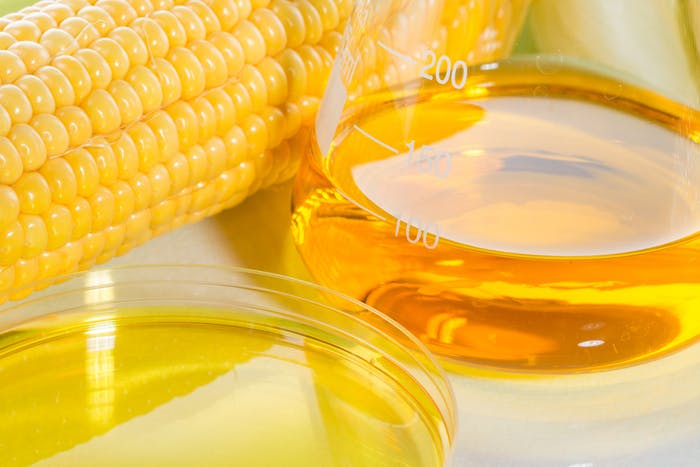High Fructrose Corn Syrup and Diabetes
© HealthyMuslim. See Terms and Conditions

HFCS is in a lot of foods and drinks, its in their because its cheap for the food producers. If you are going to insist on eating or drinking refined junk instead of eating wholesome and pure (i.e. natural whole foods), be prepared for major degenerative illnesses later in life.
Here is one report, but as we said earlier, there is much available on this subject.
Soda Warning? High-fructose corn Syrup Linked To diabetes, New Study Suggests
ScienceDaily (Aug. 23, 2007) - Researchers have found new evidence that soft drinks sweetened with high-fructose corn syrup (HFCS) may contribute to the development of diabetes, particularly in children. In a laboratory study of commonly consumed carbonated beverages, the scientists found that drinks containing the syrup had high levels of reactive compounds that have been shown by others to have the potential to trigger cell and tissue damage that could cause the disease, which is at epidemic levels.
HFCS is a sweetener found in many foods and beverages, including non-diet soda pop, baked goods, and condiments. It is has become the sweetener of choice for many food manufacturers because it is considered more economical, sweeter and more easy to blend into beverages than table sugar. Some researchers have suggested that high-fructose corn syrup may contribute to an increased risk of diabetes as well as obesity, a claim which the food industry disputes. Until now, little laboratory evidence has been available on the topic.
In the current study, Chi-Tang Ho, pH.D., conducted chemical tests among 11 different carbonated soft drinks containing HFCS. He found 'astonishingly high' levels of reactive carbonyls in those beverages. These undesirable and highly-reactive compounds associated with "unbound" fructose and glucose molecules are believed to cause tissue damage, says Ho, a professor of food science at Rutgers University in New Brunswick, N.J. By contrast, reactive carbonyls are not present in table sugar, whose fructose and glucose components are "bound" and chemically stable, the researcher notes.
Reactive carbonyls also are elevated in the blood of individuals with diabetes and linked to the complications of that disease. Based on the study data, Ho estimates that a single can of soda contains about five times the concentration of reactive carbonyls than the concentration found in the blood of an adult person with diabetes.
Ho and his associates also found that adding tea components to drinks containing HFCS may help lower the levels of reactive carbonyls. The scientists found that adding epigallocatechin gallate (EGCG), a compound in tea, significantly reduced the levels of reactive carbonyl species in a dose-dependent manner when added to the carbonated soft drinks studied. In some cases, the levels of reactive carbonyls were reduced by half, the researchers say.
"People consume too much high-fructose corn syrup in this country," says Ho. "It's in way too many food and drink products and there's growing evidence that it's bad for you." The tea-derived supplement provides a promising way to counter its potentially toxic effects, especially in children who consume a lot of carbonated beverages, he says.
But eliminating or reducing consumption of HFCS is preferable, the researchers note. They are currently exploring the chemical mechanisms by which tea appears to neutralize the reactivity of the syrup.Ho's group is also probing the mechanisms by which carbonation increases the amount of reactive carbonyls formed in sodas containing HFCS. They note that non-carbonated fruit juices containing HFCS have one-third the amount of reactive carbonyl species found in carbonated sodas with HFCS, while non-carbonated tea beverages containing high-fructose corn syrup, which already contain EGCG, have only about one-sixth the levels of carbonyls found in regular soda.
In the future, food and drink manufacturers could reduce concerns about HFCS by adding more EGCG, using less HFCS, or replacing the syrup with alternatives such as regular table sugar, Ho and his associates say. Funding for this study was provided by the Center for Advanced Food Technology of Rutgers University. Other researchers involved in the study include Chih-Yu Lo, pH.D.; Shiming Li, pH.D.; Di Tan, pH.D.; and Yu Wang, a doctoral student.
This research was reported August 23 at the 234th national meeting of the American Chemical Society, during the symposium, "Food Bioactives and Nutraceuticals: Production, Chemistry, Analysis and health Effects: health Effects."
Link to this article: Show: HTML Link • Full Link • Short Link
Share or Bookmark this page: You will need to have an account with the selected service in order to post links or bookmark this page.





|
Related Articles:
- Vitamin D Linked to Reducing Diabetes Risk
- Obesity and Diabetes Caused By Food Sweetener Fructose
- Latest Research on the Amazing Super-Nutrient Vitamin D
- The Dangers of Sugar
- Study: Healthy Diet Can Help Avoid Diabetes Drugs
- New Research on the Powerful Benefits of Garlic
- High Fructrose Corn Syrup, Ingredient in Many Popular Foods, Contaminated With Mercury
- High Fructrose Corn Syrup and Diabetes
- Chamomile Tea May Ease Diabetic Symptoms
You must be registered and logged in to comment.
Most Popular
Latest Articles
Popular Subjects
Health, fitness and longevity
Based upon the principles of health
in the Qur'an and Prophetic Traditions.
HealthyMuslim.Com
There are two bounties in which
most people lose out: good health
and free time. Al-Bukhari.























